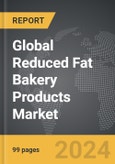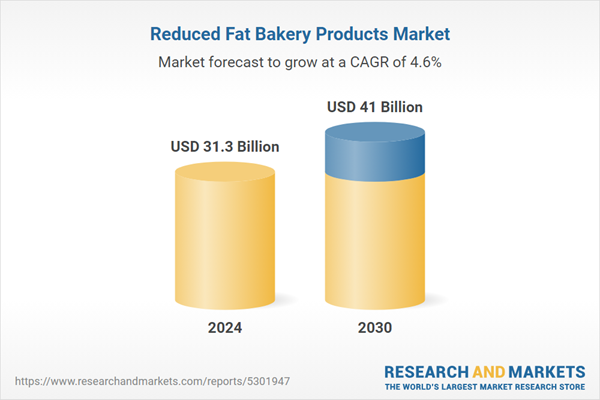Global Reduced Fat Bakery Products Market - Key Trends & Drivers Summarized
What Are Reduced Fat Bakery Products & Why Are They Valued by Health-Conscious Consumers?
Reduced fat bakery products are baked goods that have been reformulated to contain lower levels of fat compared to their traditional counterparts. These products include a wide variety of items such as reduced-fat breads, cookies, cakes, muffins, pastries, and crackers. The reduction in fat content is achieved through various methods, such as replacing fats and oils with alternative ingredients like fruit purees, yogurt, fiber-rich flours, and fat replacers such as modified starches or emulsifiers. These modifications aim to maintain the flavor, texture, and overall appeal of the products while meeting the growing demand for healthier food options.The demand for reduced fat bakery products has grown significantly due to rising health awareness, increasing concerns about obesity, and the shift toward healthier eating habits. Consumers are becoming more conscious of the impact of high-fat diets on health, leading to greater demand for baked goods with lower fat content that still deliver the taste and texture they desire. Reduced fat bakery products cater to consumers seeking options that fit within calorie-controlled diets or specific health-related dietary needs, such as those related to heart health and weight management. With their wide range of flavors and formats, these products are popular among both health-conscious individuals and those looking to maintain a balanced diet without compromising on taste.
How Do Reduced Fat Bakery Products Improve Nutrition & Meet Consumer Preferences?
Reduced fat bakery products improve nutrition by offering a lower calorie and fat content, making them a better fit for health-focused diets without sacrificing taste or quality. By reducing saturated and trans fats, these products help consumers maintain a healthier lipid profile, supporting heart health and reducing the risk of obesity-related diseases. Many reduced fat bakery products also incorporate additional nutritional benefits, such as increased fiber, whole grains, and natural ingredients, further enhancing their appeal to health-conscious consumers. For instance, reduced fat muffins may use whole wheat flour or oatmeal, adding fiber and nutrients while maintaining a satisfying texture and flavor.In terms of meeting consumer preferences, reduced fat bakery products provide a guilt-free indulgence for individuals looking to balance enjoyment with healthier choices. These products are formulated to retain the familiar taste, texture, and appearance of traditional baked goods, making them a viable alternative for those seeking to reduce their fat intake. With advancements in food science and ingredient technology, manufacturers can create reduced fat versions that closely replicate the flavor, moistness, and mouthfeel of standard baked goods, addressing consumer concerns about taste and quality. The versatility of reduced fat bakery products allows for their inclusion in various meal occasions, from breakfast and snacks to desserts, ensuring that consumers can make healthier choices throughout the day without compromising on flavor.
How Are Technological Advancements Shaping the Development of Reduced Fat Bakery Products?
Technological advancements have significantly improved the formulation, production, and quality of reduced fat bakery products, making them more appealing and satisfying to consumers. One of the key innovations is the use of fat replacers, such as modified starches, protein concentrates, and dietary fibers, which mimic the functional properties of fats in baked goods. These ingredients help maintain the texture, moisture, and stability of products while reducing overall fat content. Additionally, the incorporation of hydrocolloids, such as guar gum and xanthan gum, enhances the mouthfeel and moisture retention of reduced fat products, ensuring a more satisfying eating experience.Another significant advancement is the use of enzymatic modification in the production of reduced fat bakery products. Enzymes like lipase and amylase are used to enhance dough handling, improve volume, and maintain the crumb structure, compensating for the reduced fat content. This approach helps maintain the softness and elasticity of baked goods, which are often compromised when fats are reduced. Advances in extrusion technology have also enabled the creation of healthier snack options like reduced fat crackers and cookies, with improved crispness and shelf life.
The development of ingredient blends, such as combinations of fruit purees, yogurt, and fat-free dairy products, has improved the flavor and nutritional profile of reduced fat bakery items. Flavor-enhancement technologies, such as natural flavors and aromas, are used to boost the taste of these products, compensating for any flavor loss that might occur during fat reduction. In addition, innovative packaging techniques, such as modified atmosphere packaging (MAP), have helped maintain the freshness, texture, and shelf life of reduced fat bakery products, making them more appealing to consumers. These technological advancements have not only improved the taste, texture, and nutritional profile of reduced fat bakery products but also expanded their appeal and acceptance in the market.
What Factors Are Driving Growth in the Reduced Fat Bakery Products Market?
The growth in the reduced fat bakery products market is driven by several factors, including increasing health consciousness, rising demand for weight management solutions, advancements in food technology, and expanding consumer awareness of the health risks associated with high-fat diets. As consumers become more concerned about their overall health, there is a growing preference for foods that offer better nutritional profiles, including lower fat and calorie content. This trend is particularly evident among millennials and younger generations, who prioritize healthy eating and seek out options that align with wellness goals.The rising incidence of obesity, cardiovascular diseases, and diabetes has further fueled demand for reduced fat bakery products, as they offer a way to enjoy familiar foods while adhering to healthier dietary guidelines. The growing popularity of clean-label, natural, and functional foods has also supported market growth, as consumers look for products made with recognizable ingredients and added nutritional benefits, such as increased fiber, whole grains, and plant-based proteins. Reduced fat bakery products that meet clean-label standards are particularly attractive to health-focused consumers, driving higher adoption rates.
Technological advancements in ingredient development, fat-replacement strategies, and production processes have improved the quality and taste of reduced fat bakery products, increasing their appeal and acceptance. Emerging markets, particularly in Asia-Pacific and Latin America, are witnessing a rise in health-conscious consumers, creating new opportunities for reduced fat bakery products in these regions. The growth of online retail and e-commerce has also made it easier for consumers to access a wider variety of reduced fat baked goods, further supporting market expansion. With ongoing innovations in product development, expanding consumer interest in healthier diets, and increasing awareness of the benefits of reduced fat foods, the reduced fat bakery products market is poised for sustained growth, driven by evolving dietary preferences, health trends, and advancements in food science.
Report Scope
The report analyzes the Reduced Fat Bakery Products market, presented in terms of market value (US$ Thousand). The analysis covers the key segments and geographic regions outlined below.- Segments: Segment (Reduced Fat Bakery Products).
- Geographic Regions/Countries:World; United States; Canada; Japan; China; Europe (France; Germany; Italy; United Kingdom; Spain; Russia; and Rest of Europe); Asia-Pacific (Australia; India; South Korea; and Rest of Asia-Pacific); Latin America (Argentina; Brazil; Mexico; and Rest of Latin America); Middle East (Iran; Israel; Saudi Arabia; United Arab Emirates; and Rest of Middle East); and Africa.
Regional Analysis
Gain insights into the U.S. market, valued at $8.2 Billion in 2024, and China, forecasted to grow at an impressive 6.8% CAGR to reach $8.7 Billion by 2030. Discover growth trends in other key regions, including Japan, Canada, Germany, and the Asia-Pacific.Why You Should Buy This Report:
- Detailed Market Analysis: Access a thorough analysis of the Global Reduced Fat Bakery Products Market, covering all major geographic regions and market segments.
- Competitive Insights: Get an overview of the competitive landscape, including the market presence of major players across different geographies.
- Future Trends and Drivers: Understand the key trends and drivers shaping the future of the Global Reduced Fat Bakery Products Market.
- Actionable Insights: Benefit from actionable insights that can help you identify new revenue opportunities and make strategic business decisions.
Key Questions Answered:
- How is the Global Reduced Fat Bakery Products Market expected to evolve by 2030?
- What are the main drivers and restraints affecting the market?
- Which market segments will grow the most over the forecast period?
- How will market shares for different regions and segments change by 2030?
- Who are the leading players in the market, and what are their prospects?
Report Features:
- Comprehensive Market Data: Independent analysis of annual sales and market forecasts in US$ Million from 2024 to 2030.
- In-Depth Regional Analysis: Detailed insights into key markets, including the U.S., China, Japan, Canada, Europe, Asia-Pacific, Latin America, Middle East, and Africa.
- Company Profiles: Coverage of players such as Arla Foods Inc, Crowley Food LLC, Danone SA, Dean Foods, General Mills and more.
- Complimentary Updates: Receive free report updates for one year to keep you informed of the latest market developments.
Some of the 53 companies featured in this Reduced Fat Bakery Products market report include:
- Arla Foods Inc
- Crowley Food LLC
- Danone SA
- Dean Foods
- General Mills
- Kellogg
- Mondelez International
- Nestle SA
- PepsiCo Inc
- Tesco
- The Kraft Heinz Company
This edition integrates the latest global trade and economic shifts into comprehensive market analysis. Key updates include:
- Tariff and Trade Impact: Insights into global tariff negotiations across 180+ countries, with analysis of supply chain turbulence, sourcing disruptions, and geographic realignment. Special focus on 2025 as a pivotal year for trade tensions, including updated perspectives on the Trump-era tariffs.
- Adjusted Forecasts and Analytics: Revised global and regional market forecasts through 2030, incorporating tariff effects, economic uncertainty, and structural changes in globalization. Includes historical analysis from 2015 to 2023.
- Strategic Market Dynamics: Evaluation of revised market prospects, regional outlooks, and key economic indicators such as population and urbanization trends.
- Innovation & Technology Trends: Latest developments in product and process innovation, emerging technologies, and key industry drivers shaping the competitive landscape.
- Competitive Intelligence: Updated global market share estimates for 2025, competitive positioning of major players (Strong/Active/Niche/Trivial), and refined focus on leading global brands and core players.
- Expert Insight & Commentary: Strategic analysis from economists, trade experts, and domain specialists to contextualize market shifts and identify emerging opportunities.
Table of Contents
Companies Mentioned (Partial List)
A selection of companies mentioned in this report includes, but is not limited to:
- Arla Foods Inc
- Crowley Food LLC
- Danone SA
- Dean Foods
- General Mills
- Kellogg
- Mondelez International
- Nestle SA
- PepsiCo Inc
- Tesco
- The Kraft Heinz Company
Table Information
| Report Attribute | Details |
|---|---|
| No. of Pages | 149 |
| Published | February 2026 |
| Forecast Period | 2024 - 2030 |
| Estimated Market Value ( USD | $ 31.3 Billion |
| Forecasted Market Value ( USD | $ 41 Billion |
| Compound Annual Growth Rate | 4.6% |
| Regions Covered | Global |









